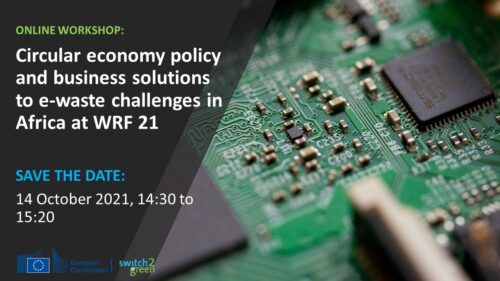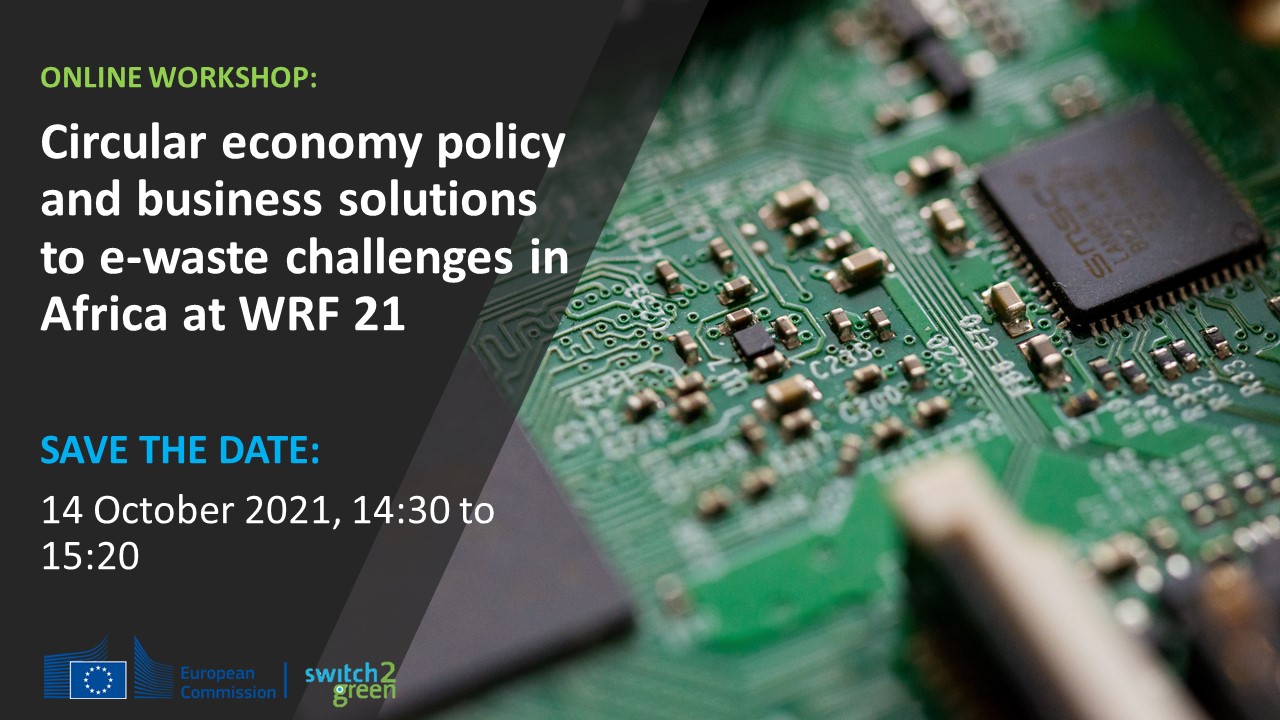Join our online workshop on Circular economy policy and business solutions to e-waste challenges in Africa at the World Resources Forum 2021.
The virtual event on October 14th aims to highlight opportunities for increasing circularity in Africa’s e-waste value chain. Taking due consideration of the African Circular Economy Alliance prioritisation of the electronics industry (one of five Big Bets for circularity in Africa) and of the findings of the EU SWITCH Africa Green ‘E-magin Ghana’ project, the workshop will illustrate best practices, highlight learning opportunities (notably from partnerships between formal and informal e-waste management actors), and provide recommendations on attracting investment for e-waste recycling across Africa, including through effective e-waste policy design and implementation. The workshop will also build on EU circular economy experiences and policies in the electronics and ICT product value chains.
The workshop will discuss key challenges to improve e-waste management, like the formalization of informal Micro, Small and Medium-sized Enterprises (MSMEs), the establishment of collection mechanisms, the development of capacities, and the creation of circular economy awareness among the wide range of stakeholders in the e-waste business. Issues related to coordination among on-going e-waste management initiatives in Africa and replication of circular economy solutions across African countries will also be on the agenda.
The workshop will be organised by the EU SWITCH to Green Facility on behalf of the European Commission Directorate General for International Partnerships (INTPA), in coordination with the Directorate General for Environment.
Join us in October 14, 2021 (14:30 – 15:20h) for an exciting discussion onut how to tackle e-waste.
 This session welcomes policy makers and practitioners interested in the circular economy, from across the globe. It is an excellent opportunity to interact with government and business leaders, programme managers and experts united by a shared objective to reduce e-waste and establish a circular economy.
This session welcomes policy makers and practitioners interested in the circular economy, from across the globe. It is an excellent opportunity to interact with government and business leaders, programme managers and experts united by a shared objective to reduce e-waste and establish a circular economy.
Why attend this session?
- Get into what considerations are important when establishing e-waste collection mechanisms
- Learn about new opportunities to engage the private sector in circular e-waste processes, including by formalising informal e-waste businesses
- Understand what makes a sound policy and action plan to increase circularity in the ICT sector
Under the overarching theme of “A Green Deal for Sustainable Resources”, WRF2021 will shine a light on the resource requirements and implications underpinning the global green transition, as stated in international agreements and agendas such as the Paris Agreement, the European Green Deal, the Africa Green Stimulus Programme, and the Sustainable Development Agenda. As many of the technologies and infrastructures necessary to facilitate the shift to a low-carbon economy will require significant mineral and metal inputs, it is of paramount importance to ensure that the rising demand for this type of resources does not translate into unsustainable pressure into fragile natural ecosystems around the world. This is why issues of resource governance, management and use come to play a key role to ensure that the green transition will take place in a truly sustainable and fair manner.
Such global context calls for an integrated and systemic approach where all the environmental, social, economic and geo-political implications are taken into account and properly assessed at all stages of the resources value chain: from extraction to use and (post-use) recovery. Following this logic, WRF2021 will consist of three conference tracks:
- Primary Resources: Fair Resource Extraction for a quality future
- Secondary Resources: From Waste to Resources for development
- Circular Economy: Designing circular systems for resources

